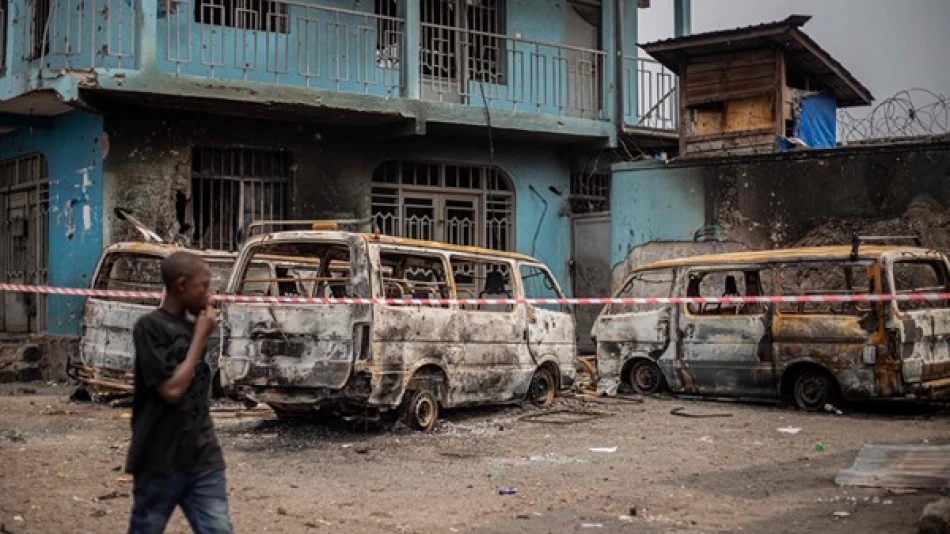
Deadly Attack Rocks Congolese Church, Dozens Killed
**Church Attack in Congo Shatters Months of Regional Peace, Exposing Fragile Security Gains**
At least 35 people were killed in a brutal attack on a Catholic church in northeastern Democratic Republic of Congo on Sunday, marking a deadly return to violence in the Ituri province after months of relative calm. The assault on the church in Komanda town highlights the persistent security challenges facing one of Africa's most resource-rich yet conflict-plagued regions.
The Attack: A Night of Terror
Armed militants stormed the Catholic parish church in Komanda around 9 PM local time on Saturday evening, unleashing gunfire that shattered the night's quiet. Dieudonne Katanabo, a local community leader from the Umoja neighborhood, described hearing sustained gunfire near the parish church, with the grim discovery of 35 bodies by morning.
Father Emi Lukana Dego, the parish priest of Komanda, provided harrowing details of the aftermath: "We have at least 31 dead and six seriously wounded... some young people were kidnapped, and we have no news of them." Additional bodies were discovered elsewhere in the town, bringing various casualty estimates to as high as 38 deaths.
The Suspected Perpetrators
Christophe Munyandero, coordinator of the local NGO "Convention for Respect of Human Rights," attributed the attack to militants from the Allied Democratic Forces (ADF), a rebel group with historical ties to Uganda that has terrorized the region for decades. The ADF has evolved from a Ugandan rebel movement into one of the most brutal armed groups operating in eastern Congo, with some factions pledging allegiance to the Islamic State.
ADF's Expanding Terror Campaign
The ADF's targeting of religious sites represents a calculated strategy to instill maximum fear among local populations. Churches serve as community gathering points and symbols of stability in regions where state presence remains weak. This attack pattern mirrors tactics used by extremist groups across the Sahel and other conflict zones in Africa.
Breaking the Calm: What This Means for Ituri Province
The assault ends what had been a relatively peaceful period for Ituri province, a mineral-rich area that has experienced decades of ethnic violence and armed group activity. The province sits atop significant gold deposits and serves as a transit route for various commodities, making territorial control economically valuable for armed groups.
Economic and Humanitarian Implications
For international investors and mining companies operating in the region, the renewed violence signals potential disruptions to supply chains and extraction operations. Congo supplies critical minerals including cobalt, copper, and gold that are essential for global technology and renewable energy sectors. Security deterioration in Ituri could impact these supply lines and drive up commodity prices.
Humanitarian organizations, which had begun expanding operations during the recent calm, may now face renewed access restrictions and security protocols that limit their ability to serve vulnerable populations.
Regional Security Dynamics
The attack occurs against the backdrop of broader regional instability, with eastern Congo hosting numerous armed groups despite the presence of UN peacekeeping forces and joint military operations with Uganda. Unlike successful counter-terrorism efforts in countries such as Rwanda or Ghana, Congo's vast territory and weak state capacity have made it difficult to establish lasting security gains.
International Response Challenges
The international community faces a familiar dilemma in responding to Congo's security crises. Military interventions have historically produced mixed results, while diplomatic solutions require functional state institutions that remain underdeveloped in many parts of the country. The European Union and United States have invested heavily in security sector reform, but progress remains incremental.
This latest attack underscores how quickly security gains can evaporate in fragile environments, leaving civilian populations vulnerable to extremist violence. For policymakers and security analysts, it serves as a reminder that sustainable peace in eastern Congo requires not just military pressure on armed groups, but also strengthened governance and economic opportunities that can compete with the incentives for joining militant organizations.
Most Viewed News

 Layla Al Mansoori
Layla Al Mansoori






